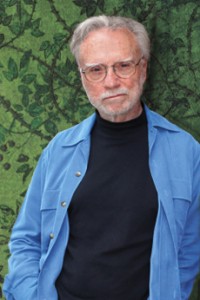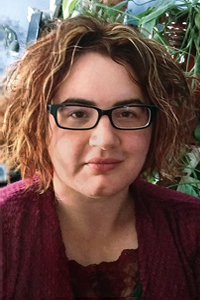SF in India: The 19th Annual/5th International Science Fiction Conference by Srinarahari Mysore

The 19th Annual/5th International Science Fiction Conference was organized by the Indian Association for Science Fiction Studies Bangalore (IASFS) in collaboration with Bangalore University and held online December 7-10, 2020. The theme was “All Roads Lead to Science Fiction”, and participants included members of 58 departments at the university, faculty from 700 affiliated colleges, scientists, authors, editors, journalists, and luminaries from all over the world.
A variety of activities and programs were simultaneously held in 12 channels, including University Programs, Science Fiction, Language and Culture, Life Science and Micro-Biology, Humanities and Social Sciences, Performing Arts, Journalism and Mass Communication, and more.
The conference began with the invocation by Ranjani Vasuki. University student Malavika B Swamy introduced the vice chancellor of Bangalore University, professor Venugopal KR, who welcomed the guests, including Radhakrishna K, the former Chairperson of Indian Space Research Organization, who delivered the inaugural address, and Sujan Sengupta, associate professor at the Indian Institute of Astrophysics, who presented the plenary talk.
Venugopal lit the inaugural the lamp with Srinarahari, conference convenor Krishna Murthy, and the coordinators of the channels, followed by the inauguration of each channel individually.
Krishna Murthy G delivered the preamble, highlighting the presentation of 300 papers, the presence of 250 special guest lecturers, and the release of 20 books during the event. He added that the University is publishing four international journals collecting selected scholarly papers presented during the conference: a journal of physics, a journal of computational and life sciences including biological sciences, and a journal of current research in humanities and social sciences and engineering.
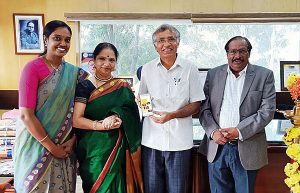
Srinarahari read the report of the IASFS, a non-profit organization registered under Karnataka State Society Act, dedicated to providing guidance, material, and a platform for the development and progress of research in the field of SF for all, without restrictions to any class, creed, region, race, gender, language, or other. He highlighted how the association could organize 14 national and four international conferences in collaboration with departments of post graduate and doctoral studies in English in various universities of the country. He requested the government of Karnataka and the vice-chancellor of the university to consider establishing a virtual science fiction study chair with an honorary chairperson, supported by a technical team from the university, so there would be uninterrupted progress in the field of research creative work.
Mr. Yeddyurappa, the chief minister of Karnataka state, congratulated the organizers for the success of the event, and quoted Albert Einstein, who said that imagination is more important than knowledge. The amalgamation of imagination, curiosity, and need are crucial for science. It requires speculation and skepticism. Science fiction can inspire, educate and entertain. He hoped the deliberations would generate many ideas to help the growth of science and technology and be useful to humanity.
Ashwath Narayan, the cabinet minister for higher education, information technology, bio-technology, science and technology, and skill development addressed the virtual gathering, and observed that the internet is the global platform that provides an opportunity for the exchange of academic and research innovations. He said the theme of the conference is very interesting and needed in the present world. He observed that it is essential to discuss social, economic, and social issues and emerge with solutions.
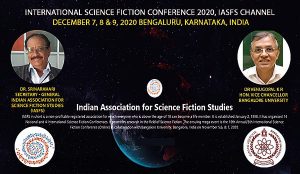
Suresh Kumar, the cabinet minister for primary and secondary education, as well as Manu Baligar, the President of Kannada Sahithya Parishad, spoke about how the conference could benefit people from all walks of life, and particularly the Kananda-speaking people of the Karnataka state in India.
While delivering the presidential address, the honorable vice chancellor of Bangalore University remarked that it was a great day for the university, as all 58 departments of post graduate and doctoral study were taking part in the conference. Sharing his personal achievements as a background, Venugopal disclosed that he has earned 11 degrees in addition to two doctoral degrees in economics and computer science and an engineering degree. He recalled the day in September 2019 when the secretary-general of the Indian Association for Science Fiction Studies, Srinarahari, approached him with a proposal to hold the conference in collaboration with Bangalore University. He felt it difficult to answer on that day, as the budget proposal would have exceeded millions of rupees to organize such a large conference. Then COVID-19 took over. He thought the university had lost a wonderful opportunity, but things always change, because of the impact of science and technology. What felt impossible a year before became possible by transitioning to a virtual, online conference. During the last eight months, the university had conducted online classes, which gave him confidence to hold a virtual conference.

Analyzing the genre, he remarked that SF is the literature of change. One can observe science, technology, innovations, extrapolation, planets, time travel, catastrophe, and disaster, or any of those combined, depending on the author’s imagination. What the author imagines and visualizes today becomes scientific reality tomorrow. The movies of the present also become the real world of tomorrow. What appears to be fictional today could be a reality in fifty years. To conclude, the professor said that science fiction stories are about human beings; human problems and human solutions.
The 58 departments were grouped under ten channels, holding parallel sessions on all the days of the conference. The Indian Association for Science Fiction Studies had an exclusive channel for science fiction with its coordinator Srinarahari, and the university had a channel managed by the convener of the conference, Krishna Murthy. The latter included online plenary talks by eminent scientists, astrophysicists, Nobel Laureates, and others, including Nobel Laureate for Physics (2019) Didier Patrick Queloz; NASA scientist Ravikumar Kopparapu; Radhakrishna K, former chairperson of the Indian Space Research Organization; Annapurni Subramaniam, Director of the Indian Institute of Astrophysics; and more.
Other channels brought in eminent persons for online lectures, including academics, musicians, chemists, psychologists, sociologists, experts on intelligence and security, and other areas.
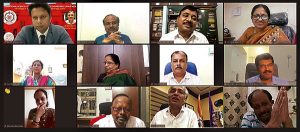
Twenty books were released during the event, including works on engineering, science and technology, music, and science fiction. Galakke Sikka Chandira by Savitha Srinivas, an Indian police service officer, is a Kannada-language SF about the colonization of Moon and attempts to provide solutions to contemporary humanistic problems.
The science fiction channel held 17 sessions, including paper presentations by academic practitioners at the universities, PhD research scholars, undergraduate students, retired officials, senior citizens, scientists, science and SF writers, working women, homemakers, medical doctors, engineers, lawyers, farmers, industrialists, writers, critics, media persons, and others.
There were also “Authors Speak” events, with special lectures from editors and authors, and a talk by Lucie Lukacovicova and Julie Nováková of the Czech Republic celebrating the hundredth anniversary of the play R.U.R. by Karel Čapek.
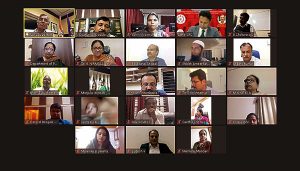
There were several SF stories presented by their authors during “Narrating Stories of Tomorrow” sessions. The stories were in English, Hindi, and vernacular languages. Eminent SF writers like Shweta Taneja, Kalpna Kulshreshta, Arvind Dubey, and Sumithra chaired these sessions. The themes of the sessions were “SF from Singapore and Czech Republic perspectives”, “Artificial Intelligence”, “Ecology and Science Fiction”, “SF from Indian, American and Czech Republican Perspectives”, and “Portraiture of Women in Science Fiction works”. Papers were presented on various sub-themes: “Authors Narrate Stories of Tomorrow”, “Visual Science Fiction – Movies”, “Panel Discussion with Science Fiction Magazine Editors and Webmasters”, “Authors Speak”, and “Framing SF Curriculum for UG courses”. Each session began with pre-recorded videos introducing the ch airperson, co-chair, and each paper presenter/guest speaker/panelist. The chairperson’s remarks were followed by the paper presentations in each session and in all the panel discussions.
The Bangalore University department of performing arts joined with the Science Fiction group channel, and both groups worked together in a common studio, and dance, music, and drama programs highlighting Indian culture and tradition were streamed on all four days, alternating with the SF activities. The performances were organized by Susheela SN and Pavithra of the performing arts department.
The second day was inaugurated by medical doctor BD Joshi; the third day by Purushothaman, the founder and president of IASFS; and the fourth day by Deepa Kamal, who represented the student community.
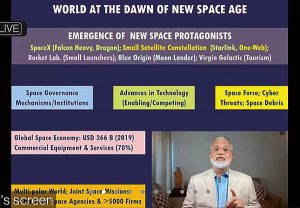
Coronavirus made an impact on this mega-event. Out of 122 abstract submissions, only 70% were able to send pre-recorded videos. A few of the chairpersons, guest speakers, and anchor persons contracted COVID-19, and the schedule of the program was badly affected. It was a Herculean task for the organizers to find suitable substitutes.
The organizers have uploaded videos pertaining to the Inauguration, the keynote by a Nobel Laureate, special lectures by eminent personalities, deliberations of presentations, panel discussions, interviews, plenary sessions, and authors narrating stories of tomorrow to YouTube and Facebook. The videos of all the 17 sessions of Channel One are also accessible. Readers may see the videos by visiting the gallery of the website: <https://iasfs.in>.
We invite all the readers of Locus and members of SF fandom to join and actively participate in the upcoming proposed regional, national, and international in-person IASFS conferences during the post-pandemic era, perhaps at the end of 2021.
–Srinarahari Mysore
Photos by Srinarahari Mysore.
This report and more like it in the April 2021 issue of Locus.
 While you are here, please take a moment to support Locus with a one-time or recurring donation. We rely on reader donations to keep the magazine and site going, and would like to keep the site paywall free, but WE NEED YOUR FINANCIAL SUPPORT to continue quality coverage of the science fiction and fantasy field.
While you are here, please take a moment to support Locus with a one-time or recurring donation. We rely on reader donations to keep the magazine and site going, and would like to keep the site paywall free, but WE NEED YOUR FINANCIAL SUPPORT to continue quality coverage of the science fiction and fantasy field.
©Locus Magazine. Copyrighted material may not be republished without permission of LSFF.




